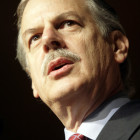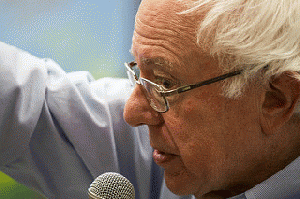Reprinted from Campaign For America's Future
The Democratic establishment and liberal commentariat lathered itself into a fine hysteria last week. What began as a Clinton surrogate meme -- (Bernie has done his job, but now he's hurting Clinton and should get out of the race) -- became a maddened chorus. The predictably angry reaction of Sanders delegates -- and truly deplorable behavior by some -- to preemptory rulings by a pro-Clinton Nevada party chair was blown into a mythical scene of chair-throwing violence, based largely on a report by a biased reporter who wasn't even there. The divisive DNC Chair Debbie Wasserman Schultz did her best to escalate rather than defuse the situation. Zealous Clinton advocates like Barney Frank and Paul Krugman slurred Sanders character because he wouldn't drop out of the race. Pundits like Eugene Robinson ("behaving like a two year old") and Jonathan Chait ("maddeningly narcissistic") piled on. Sanders voters were scorned as befuddled innocents who can't do addition, or, as Hillary Clinton earlier suggested, dupes that are being misled by Sanders misinformation. The New York Times and the Washington Post fanned the fames with alarmist headlines.
Slurs and insults are an odd way to build party unity. What is this fit of hysteria about? What has Sanders done to trigger this circular firing squad? What does Bernie want?
What Bernie Wants
Sanders' intentions are not a secret. He has stated them clearly from the beginning of his remarkable presidential run. He hopes to win the nomination. And he intends to build a "political revolution" to change the direction of the party and the country, to challenge the corrupted politics and rigged rules that work only for the few and not the vast majority.
As movement builder, he has every reason to stay in the race. He's still drawing stunning crowds. He's still energizing a new generation. He has a responsibility to take his message across the country, to educate and proselytize.
As a candidate, he stays in the race because voters keep him in. He still has a shot -- however small -- at the nomination. He keeps gaining momentum. He's won five of the last six primary contests, and basically tied the sixth (Kentucky). He won the closed primary in Oregon even after the mainstream media press declared that the race was over. He's now got a chance to win California, in a primary marked by the diversity of its voters. His campaign raised more from its small donors than the Clinton campaign for the fourth month in a row in April.
As things stand now, Clinton seems certain to finish the primary season with more elected delegates than Sanders and with more total votes. If elected delegates chose the nominee, she would win. But they don't. Clinton will not have won the required majority of the delegates to the Democratic Convention, because the rules of the party say that the 712 superdelegates who are appointed, not elected, get to vote for whomever they think is the stronger candidate. These are party officials, politicians, and leaders of DNC accredited institutions. They constitute 15% of the convention voters and will determine who is the nominee.
Playing by those rules, Sanders says he will appeal to those delegates to choose him when they cast their vote at the convention. He has a strong argument to make, particularly if he wins California. He's the only candidate left standing whom Americans view favorably. Clinton suffers historic levels of disfavor, exceeded only by that of Donald Trump. Coming from nowhere, Sanders has grown stronger as his message has spread. Sanders runs better against Trump than Clinton in both national and most swing state polls. He fares far better among independents. He is more likely to inspire and turn out vital millennial voters. His message -- and his integrity -- will be a stark contrast to the bombast and duplicity of Trump. Surely he has a case to make.
So Sanders continues his critique of Hillary Clinton on issues and on the big money fueling her campaign. He continues to call on the Democratic Party to "open its doors and let the people in," not remain a party "dependent on big money campaign contributions and... a party of limited energy." [DNC Chair Debbie Wasserman Schultz's tone deaf response to that was to repeal Obama's ban on lobbyist contributions to the Democratic Convention).
Sanders has already made it clear that if he doesn't win the nomination, he will endorse and stump for the winner. The most notable addition to his stump speech recently has been an extended attack on Donald Trump, featuring the riff: "I come from the working class of this country, and I will be damned if we will allow the Republican Party...to win the votes of working class Americans."
Democratic voters seem at ease with Sanders' course. A recent CBS/NY Times poll showed that by 59-34% Democratic voters say that the "long race for the nomination" will help the Democrats in November rather than hurt it. (And the number is a sharp contrast with 2008, when by a virtual reverse margin (38-54%) Democrats thought the long race hurt the party in November.) By 50 to 48, Democrats describe the party as united rather than divided, again a stark contrast with 2008 when by 56 to 42% Democrats thought the party divided. By 83-14%, Democratic voters already say they'll support Clinton if she becomes the nominee. The hand wringing about Sanders dividing the party seems overwrought at best.
House leader Nancy Pelosi, one of the few Democratic leaders not to lose her head in the past days, has it right. She praised Sanders"as a positive force in the Democratic Party," saying "he's has awakened in some people an interest in the political process that wasn't there...And I think that's positive."
So why the hysteria?
The Clinton Problem
The problem, of course, isn't the Sanders' obstinacy; it is Clinton's weakness. The Democratic establishment essentially cleared the field for her. She started with all of the money, all of the endorsements, universal name recognition, a forbidding lead in the polls, and her pick of the best campaign operatives. She's battle-tested. She's intelligent, with remarkable energy and unmatched experience. But somehow she can't lock up a convention majority from elected delegates against a septuagenarian democratic Socialist who is funding his campaign with small donations.
(Note: You can view every article as one long page if you sign up as an Advocate Member, or higher).






